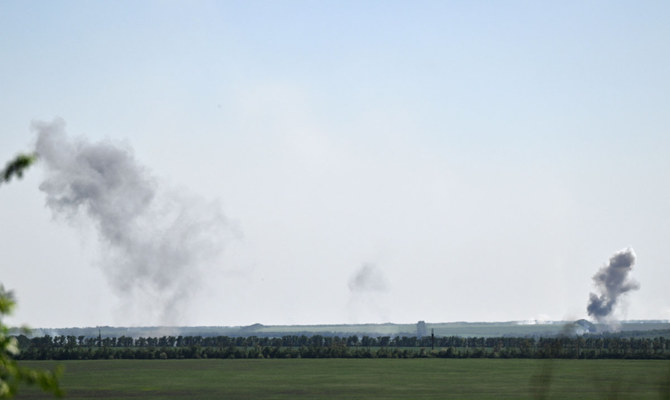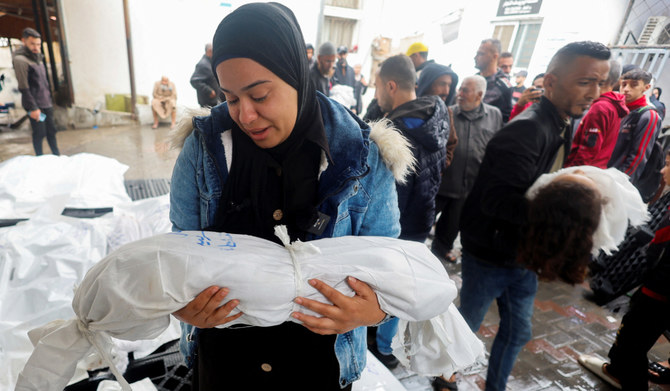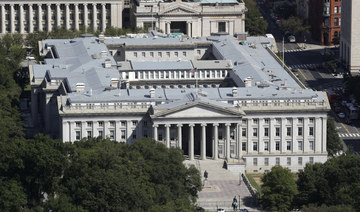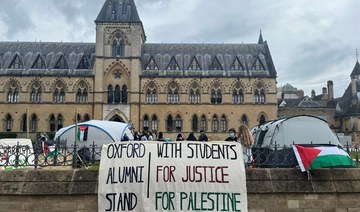WASHINGTON: Federal authorities expressed increased alarm Thursday about a long-undetected intrusion into US and other computer systems around the globe that officials suspect was carried out by Russian hackers. The nation’s cybersecurity agency warned of a “grave” risk to government and private networks.
The hack compromised federal agencies and “critical infrastructure” in a sophisticated attack that was hard to detect and will be difficult to undo, the Cybersecurity and Infrastructure Security Agency said in an unusual warning message. The Department of Energy acknowledged it was among those that had been hacked.
The attack, if authorities can prove it was carried out by Russia as experts believe, creates a fresh foreign policy problem for President Donald Trump in his final days in office.
Trump, whose administration has been criticized for eliminating a White House cybersecurity adviser and downplaying Russian interference in the 2016 presidential election, has made no public statements about the breach.
President-elect Joe Biden, who will inherit the potentially difficult US-Russia relationship, spoke up forcefully about the hack, declaring that he and Vice President-elect Kamala Harris “will make dealing with this breach a top priority from the moment we take office.”
“We need to disrupt and deter our adversaries from undertaking significant cyberattacks in the first place,” he said. “We will do that by, among other things, imposing substantial costs on those responsible for such malicious attacks, including in coordination with our allies and partners.”
“There’s a lot we don’t yet know, but what we do know is a matter of great concern,” Biden said. He thanked administration “public servants” who he said were “working around-the-clock to respond to this attack.”
CISA officials did not respond to questions and so it was unclear what the agency meant by a “grave threat” or by “critical infrastructure” possibly targeted in the attack that the agency previously said appeared to have begun last March. Homeland Security, the agency’s parent department, defines such infrastructure as any “vital” assets to the US or its economy, a broad category that could include power plants and financial institutions.
The agency previously said the perpetrators had used network management software from Texas-based SolarWinds to infiltrate computer networks. Its new alert said the attackers may have used other methods, as well.
Tech giant Microsoft, which has helped respond to the breach, revealed late Thursday that it’s been working to notify more than 40 organizations that were compromised using “additional and sophisticated measures” beyond the back door into SolarWinds systems. Microsoft said most of the compromised customers are in the United States, with victims also in Canada, Mexico, Belgium, Spain, the United Kingdom, Israel and the United Arab Emirates.
Over the weekend, amid reports that the Treasury and Commerce departments were breached, CISA directed all civilian agencies of the federal government to remove SolarWinds from their servers. The cybersecurity agencies of Britain and Ireland issued similar alerts.
A US official previously told The Associated Press that Russia-based hackers were suspected, but neither CISA nor the FBI has publicly said who is believed to be responsible. Asked whether Russia was behind the attack, the official said: “We believe so. We haven’t said that publicly yet because it isn’t 100% confirmed.”
Another US official, speaking Thursday on condition of anonymity to discuss a matter that is under investigation, said the hack was severe and extremely damaging although the administration was not yet ready to publicly blame anyone for it.
“This is looking like it’s the worst hacking case in the history of America,” the official said. “They got into everything.”
At the Department of Energy, the initial investigation revealed that malware injected into its networks via a SolarWinds update has been found only on its business networks and has not affected national security operations, including the agency that manages the nation’s nuclear weapons stockpile, according to its statement. It said vulnerable software was disconnected from the DOE network to reduce any risk.
The intentions of the perpetrators appear to be espionage and gathering information rather than destruction, according to security experts and former government officials. If so, they are now remarkably well situated.
Thomas Bossert, a former Trump Homeland Security adviser, said in an opinion article in The New York Times that the US should now act as if the Russian government had gained control of the networks it has penetrated. “The actual and perceived control of so many important networks could easily be used to undermine public and consumer trust in data, written communications and services,” he wrote.
Members of Congress said they feared that taxpayers’ personal information could have been exposed because the IRS is part of Treasury, which used SolarWinds software. Experts involved in the hack response say the intruders are not likely interested in such data because they are intelligence agents narrowly focused on sensitive national security data — and trying to steal taxpayer info would likely set off alarms.
Tom Kellermann, cybersecurity strategy chief of the software company VMware, said the hackers are now “omniscient to the operations” of federal agencies they’ve infiltrated “and there is viable concern that they might leverage destructive attacks within these agencies” now that they’ve been discovered.
Among the business sectors scrambling to protect their systems and assess potential theft of information are defense contractors, technology companies and providers of telecommunications and the electric grid.
A group led by CEOs in the electric power industry said it held a “situational awareness call” earlier this week to help electric companies and public power utilities identify whether the compromise posed a threat to their networks.
And dozens of smaller institutions that seemed to have little data of interest to foreign spies were nonetheless forced to respond to the hack.
The Helix Water District, which provides drinking water to the suburbs of San Diego, California, said it provided a patch to its SolarWinds software after it got an advisory the IT company sent out about the hack to about 33,000 customers Sunday.
“While we do utilize SolarWinds, we are not aware of any district impacts from the security breach,” said Michelle Curtis, a spokesperson for the water district.
Hack against US is ‘grave’ threat, cybersecurity agency says
https://arab.news/2j4rm
Hack against US is ‘grave’ threat, cybersecurity agency says

- The hackers, suspected to be Russian spies, gained control of the networks via the SolarWinds cybersecurity software
- Tech giant Microsoft, which has helped respond to the breach,t said most of the compromised customers are in the US
Ground invasion of Rafah would be ‘intolerable,’ UN chief warns

- Israel has killed more than 34,700 Palestinians, around two-thirds of them children and women, according to Gaza health officials
UNITED NATIONS, United States: A ground invasion of Rafah would be “intolerable,” UN Secretary-General Antonio Guterres said Monday, calling on Israel and Hamas “to go an extra mile” to reach a ceasefire deal.
“This is an opportunity that cannot be missed, and a ground invasion in Rafah would be intolerable because of its devastating humanitarian consequences, and because of its destabilizing impact in the region,” Guterres said as he received Italian President Sergio Mattarella.
UK military personnel’s data accessed in hack, BBC reports

- MPs could be informed about the development in the Commons on Tuesday
Some personal information in a payroll system used by Britain’s defense department has been accessed in a data breach, the BBC reported on Monday.
The system was managed by an external contractor and no operational Ministry of Defense data was obtained, the broadcaster said, adding that the department took the system off-line immediately.
Information like names and bank details of current and some former members of the Royal Navy, Army and Air Force was compromised, according to the report.
The Ministry of Defense did not immediately respond to a Reuters’ request for comment outside working hours.
MPs could be informed about the development in the Commons on Tuesday, the report added.
Russia says it takes control of two more settlements in eastern Ukraine

- Russia has made slow but steady advances since taking Avdiivka in February, with a string of villages in the area falling to Moscow’s forces
MOSCOW: Russian forces have taken control of the settlements of Soloviove in Ukraine’s eastern Donetsk region and Kotliarivka further north in the Kharkiv region, the defense ministry said on Monday.
Ukraine’s military made no mention of either locality in its evening General Staff report. Kharkiv Regional Governor Oleh Syniehubov said on Monday that Kotliarivka, located near the town of Kupiansk, was one of several locations to come under Russian shelling.
But Ukrainian bloggers appeared to acknowledge that both villages were in Russian hands.
DeepState, a popular forum on the war, noted on Saturday that Kotliarivka had been captured by Russian forces and on Sunday said the neighboring village of Kyslivka was also in Russian hands.
DeepState reported that Soloviove, northwest of the Russian-held town of Avdiivka, had been taken by Russian forces last week.
Russia has made slow but steady advances since taking Avdiivka in February, with a string of villages in the area falling to Moscow’s forces.
UNICEF warns 600,000 children face ‘catastrophe’ in Rafah

- Calling again for a ceasefire and safe access for humanitarian organizations, the agency highlighted there are some 78,000 infants under age two sheltering in the city, along with 175,000 children under five who are affected by infectious disease
- Israel has killed more than 34,000 Palestinians in Gaza, mostly women and children, according to the health ministry in the Hamas-run territory
NEW YORK: Some 600,000 children packed into Gaza’s Rafah city face “further catastrophe,” UNICEF warned on Monday, urging against their forced relocation after Israel ordered an evacuation ahead of its long-threatened ground invasion.
“Given the high concentration of children in Rafah ... UNICEF is warning of a further catastrophe for children, with military operations resulting in very high civilian casualties and the few remaining basic services and infrastructure they need to survive being totally destroyed,” the UN children’s agency said in a statement.
It said Gaza’s youth were already “on the edge of survival,” with many in Rafah — where the agency said the population has soared to 1.2 million people, half of them children — already displaced multiple times and with nowhere else to go.
“More than 200 days of war have taken an unimaginable toll on the lives of children,” said UNICEF Executive Director Catherine Russell.
“Rafah is now a city of children, who have nowhere safe to go in Gaza,” she said, warning that a large-scale military operation by Israel would bring “chaos and panic, and at a time where (children’s) physical and mental states are already weakened.”
UNICEF estimates that Rafah’s population has swelled to nearly five times its normal figure of 250,000 residents.
Calling again for a ceasefire and safe access for humanitarian organizations, the agency highlighted there are some 78,000 infants under age two sheltering in the city, along with 175,000 children under five who are affected by infectious disease.
Gaza’s bloodiest-ever war began following Hamas’s unprecedented Oct. 7 attack on Israel.
Israel has conducted a retaliatory offensive that has killed at least 34,735 people in Gaza, according to the Hamas-run
territory’s Health Ministry.
Of that toll, more than 14,000 are children, the ministry has said.
Israeli Prime Minister Benjamin Netanyahu has vowed to send ground troops into Rafah regardless of any truce, despite concerns from the US, other countries, and aid groups.
Hamas official Izzat Al-Rashiq said in a statement that any Israeli operation in Rafah would put the truce talks in jeopardy.
Senior Hamas official Sami Abu Zuhri said the evacuation order was a “dangerous escalation” that would have consequences.
“The US administration, alongside the occupation, bears responsibility for this terrorism,” the official said.
Hamas said later in a statement that any offensive in Rafah would not be a “picnic” for Israeli forces and said it was fully prepared to defend Palestinians there.
Aid agencies have warned that the evacuation order will lead to an even worse humanitarian disaster in the crowded coastal enclave of 2.3 million people reeling from seven months of war.
“Forcing 1 million displaced Palestinians from Rafah to evacuate without a safe destination is not only unlawful but would lead to catastrophic consequences,” British charity ActionAid said.
Nick Maynard, a British surgeon trying to leave Gaza on Monday, said in a voice message from the Gaza side of the Rafah crossing into Egypt: “Two huge bombs have just gone off immediately outside the crossing. There’s a lot of gunfire as well about 100 meters from us. We are very unclear whether we will get out.”
“Driving through Rafah, the tension was palpable with people evacuating as rapidly as they could.”
Witnesses said the areas in and around Rafah where Israel wants to move people are already crowded with little room for more tents.
“The biggest genocide, the biggest catastrophe, will take place in Rafah. I call on the whole Arab world to interfere for a ceasefire — let them interfere and save us from what we are in,” said Aminah Adwan, a displaced Palestinian.
Israel has been threatening to launch incursions in Rafah, which it says harbors thousands of Hamas fighters and potentially dozens of hostages.
Victory is impossible without taking Rafah, it says.
New York’s Columbia University cancels graduation ceremony as students remain defiant

- Pro-Palestinian protests put paid to event planned for May 15
NEW YORK: New York’s prestigious Columbia University has announced that it is canceling its main graduation ceremony, scheduled for next week, because of ongoing pro-Palestinian protests.
The announcement on Monday is the latest development in a movement that began nearly three weeks ago at Columbia and has swept college campuses nationwide.
The graduation ceremony had been scheduled for May 15 on the south lawn of the Manhattan campus, where protest encampments had been based before authorities dismantled them last week.
The Ivy League institution said it would “forego the university-wide ceremony” and hold a series of smaller events instead.
“We are determined to give our students the celebration they deserve, and that they want,” Columbia announced, saying “smaller-scale, school-based celebrations are most meaningful to them and their families.”
The university added: “We will focus our resources on those school ceremonies and on keeping them safe, respectful, and running smoothly. A great deal of effort is already underway to reach that goal.”
Students across the US have protested and set up tents at dozens of universities to register their opposition to the war in Gaza, while calling on President Joe Biden to do more to stop the bloodshed.
They have also demanded their institutions cease supporting companies that support Israel’s government.
Maya James, a psychology student at Columbia, told Arab News: “Seeing the university’s really insane response to student protests has brought so many people together, because I feel like most people on this campus can agree, including faculty, that students should not be penalized for expressing their First Amendment rights to protest, to petition, to do all of these things we’ve been encouraged to do for so long.”
She called on the university to give amnesty to students who had been suspended for expressing their First Amendment rights, which protect freedom of speech, the press, assembly, and the right to petition.
James also called on the university to disclose its investments because as “of right now there’s no visibility for us students to be able to know what the university is expected to do.”
She described the “vibes” at the protest sites as “absolutely remarkable,” with cultural and educational programs being offered and all kinds of activities being held.
She said the demonstrations were a continuation of Columbia’s long tradition of protest which began in the 1960s with its opposition to the involvement of the US in the Vietnam War.
James said it was “incredible” to see the solidarity for the Palestinian cause spread in campuses across the US, and people pushing to ensure “that we do indeed see a free Palestine within our lifetime and that our universities are no longer complicit in the genocide.”
Demonstrators have gathered on at least 40 US university campuses since April 17, often erecting tent camps to protest against the soaring death toll in the Gaza Strip. Nearly 2,000 people have been detained, according to the US media.
Police officers have forcibly ended several student sit-ins in recent days, including one at New York University at the request of its administrators.
Demonstrators had barricaded themselves inside Columbia, the epicenter of student protests in New York, and some complained about police brutality when officers cleared the faculty.
(With Agencies)


















